
Civil defense or civil protection is an effort to protect the citizens of a state from man-made and natural disasters. It uses the principles of emergency operations: prevention, mitigation, preparation, response, or emergency evacuation and recovery. Programs of this sort were initially discussed at least as early as the 1920s and were implemented in some countries during the 1930s as the threat of war and aerial bombardment grew. Civil-defense structures became widespread after authorities recognised the threats posed by nuclear weapons.

A fallout shelter is an enclosed space specially designated to protect occupants from radioactive debris or fallout resulting from a nuclear explosion. Many such shelters were constructed as civil defense measures during the Cold War.

Threads is a 1984 apocalyptic war drama television film jointly produced by the BBC, Nine Network and Western-World Television Inc. Written by Barry Hines and directed and produced by Mick Jackson, it is a dramatic account of nuclear war and its effects in Britain, specifically on the city of Sheffield in Northern England. The plot centres on two families as a confrontation between the United States and the Soviet Union erupts. As the nuclear exchange between NATO and the Warsaw Pact begins, the film depicts the medical, economic, social and environmental consequences of nuclear war.
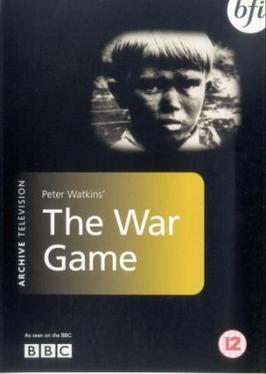
The War Game is a 1966 British pseudo-documentary film that depicts a nuclear war and its aftermath. Written, directed and produced by Peter Watkins for the BBC, it caused dismay within the BBC and also within government, and was subsequently withdrawn before the provisional screening date of 6 October 1965. The corporation said that "the effect of the film has been judged by the BBC to be too horrifying for the medium of broadcasting. It will, however, be shown to invited audiences..."

A civil defense siren, also known as an air-raid siren or tornado siren, is a siren used to provide an emergency population warning to the general population of approaching danger. It is sometimes sounded again to indicate the danger has passed. Some sirens, especially within small municipalities, are also used to alert the fire department when needed. Initially designed to warn city dwellers of air raids during World War II, they were later used to warn of nuclear attack and natural disasters, such as tornadoes. The generalized nature of sirens led to many of them being replaced with more specific warnings, such as the broadcast-based Emergency Alert System and the Cell Broadcast-based Wireless Emergency Alerts and EU-Alert mobile technologies.

Nuclear fallout is the residual radioactive material propelled into the upper atmosphere following a nuclear blast, so called because it "falls out" of the sky after the explosion and the shock wave has passed. It commonly refers to the radioactive dust and ash created when a nuclear weapon explodes. The amount and spread of fallout is a product of the size of the weapon and the altitude at which it is detonated. Fallout may get entrained with the products of a pyrocumulus cloud and fall as black rain. This radioactive dust, usually consisting of fission products mixed with bystanding atoms that are neutron-activated by exposure, is a form of radioactive contamination.

Protect and Survive was a public information campaign on civil defence. Produced by the British government between 1974 and 1980, it intended to advise the public on how to protect themselves during a nuclear attack. The campaign comprised a pamphlet, newspaper advertisements, radio broadcasts, and public information films. The series had originally been intended for distribution only in the event of dire national emergency, but provoked such intense public interest that the pamphlet was published, in slightly amended form, in 1980. Due to its controversial subject, and the nature of its publication, the cultural impact of Protect and Survive was greater and longer-lasting than most public information campaigns.

"Duck and cover" is a method of personal protection against the effects of a nuclear explosion. Ducking and covering is useful in offering a degree of protection to personnel located outside the radius of the nuclear fireball but still within sufficient range of the nuclear explosion that standing upright and uncovered is likely to cause serious injury or death. In the most literal interpretation, the focus of the maneuver is primarily on protective actions one can take during the first few crucial seconds-to-minutes after the event, while the film of the same name and a full encompassing of the advice also cater to providing protection up to weeks after the event.

Duck and Cover is a 1952 civil defense animated live-action social guidance film that is often popularly mischaracterized as propaganda.
The four-minute warning was a public alert system conceived by the British Government during the Cold War and operated between 1953 and 1992. The name derived from the approximate length of time from the point at which a Soviet nuclear missile attack against the United Kingdom could be confirmed and the impact of those missiles on their targets. The population was to be notified by means of air raid sirens, television and radio, and urged to seek cover immediately. In practice, the warning would have been more likely three minutes or less.

A blast shelter is a place where people can go to protect themselves from blasts and explosions, like those from bombs, or in hazardous worksites, such as on oil and gas refineries or petrochemical facilities. It differs from a fallout shelter, in that its main purpose is to protect from shock waves and overpressure instead of from radioactive precipitation, as a fallout shelter does. It is also possible for a shelter to protect from both blasts and fallout.

Blast from the Past is a 1999 American romantic comedy fantasy film directed by Hugh Wilson and starring Brendan Fraser, Alicia Silverstone, Christopher Walken, Sissy Spacek, and Dave Foley.

This article describes severe weather terminology used by the National Weather Service (NWS) in the United States. The NWS, a government agency operating as an arm of the National Oceanic and Atmospheric Administration (NOAA) branch of the United States Department of Commerce (DoC), defines precise meanings for nearly all of its weather terms.

The United Kingdom Warning and Monitoring Organisation (UKWMO) was a British civilian organisation operating to provide UK military and civilian authorities with data on nuclear explosions and forecasts of fallout across the country in the event of nuclear war.

An early warning system is a warning system that can be implemented as a chain of information communication systems and comprises sensors, event detection and decision subsystems for early identification of hazards. They work together to forecast and signal disturbances that adversely affect the stability of the physical world, providing time for the response system to prepare for the adverse event and to minimize its impact.

United States civil defense refers to the use of civil defense in the history of the United States, which is the organized non-military effort to prepare Americans for military attack and similarly disastrous events. Late in the 20th century, the term and practice of civil defense fell into disuse. Emergency management and homeland security replaced them.
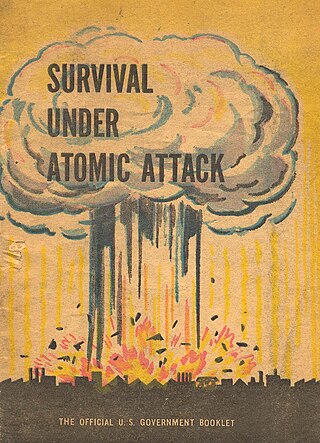
Survival Under Atomic Attack was the title of an official United States government booklet released by the Executive Office of the President, the National Security Resources Board, and the Civil Defense Office. Released at the onset of the Cold War era, the pamphlet was in line with rising fears that the Soviet Union would launch a nuclear attack against the United States, and outlined what to do in the event of an atomic attack.
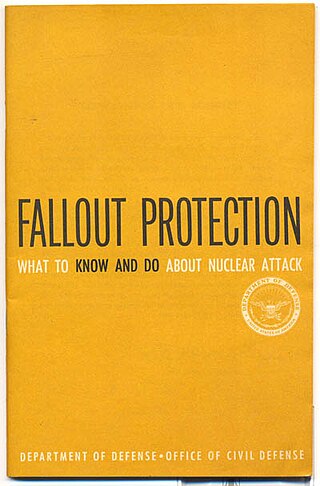
Fallout Protection: What To Know And Do About Nuclear Attack was an official United States federal government booklet released in December 1961 by the United States Department of Defense and the Office of Civil Defense. The first page of the book is a note from then-U.S. Secretary of Defense Robert McNamara explaining that the booklet is the result of the first task he was given when he assumed responsibility for the Federal Civil Defense Program in August 1961. The task, assigned by President John F. Kennedy, was to "give the American people the facts they need to know about the dangers of a thermonuclear attack and what they can do to protect themselves."
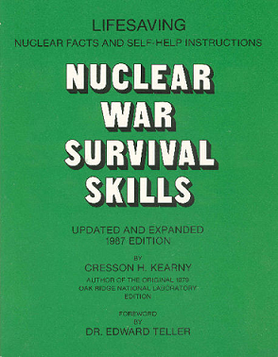
Nuclear War Survival Skills or NWSS, by Cresson Kearny, is a civil defense manual. It contains information gleaned from research performed at Oak Ridge National Laboratory during the Cold War, as well as from Kearny's extensive jungle living and international travels.
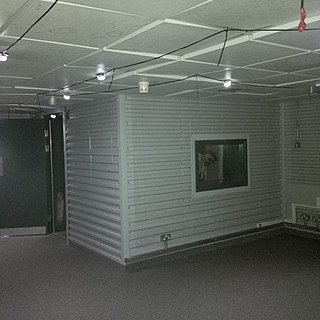
The Wartime Broadcasting Service is a service of the BBC that is intended to broadcast in the United Kingdom either after a nuclear attack or if conventional bombing destroyed regular BBC facilities in a conventional war. It is unclear if the Wartime Broadcasting Service is still operational as plans are kept mainly secretly with the BBC and government officials. According to an article by the BBC, recordings of a nuclear attack warning are still re-recorded and kept up to date periodically.
















